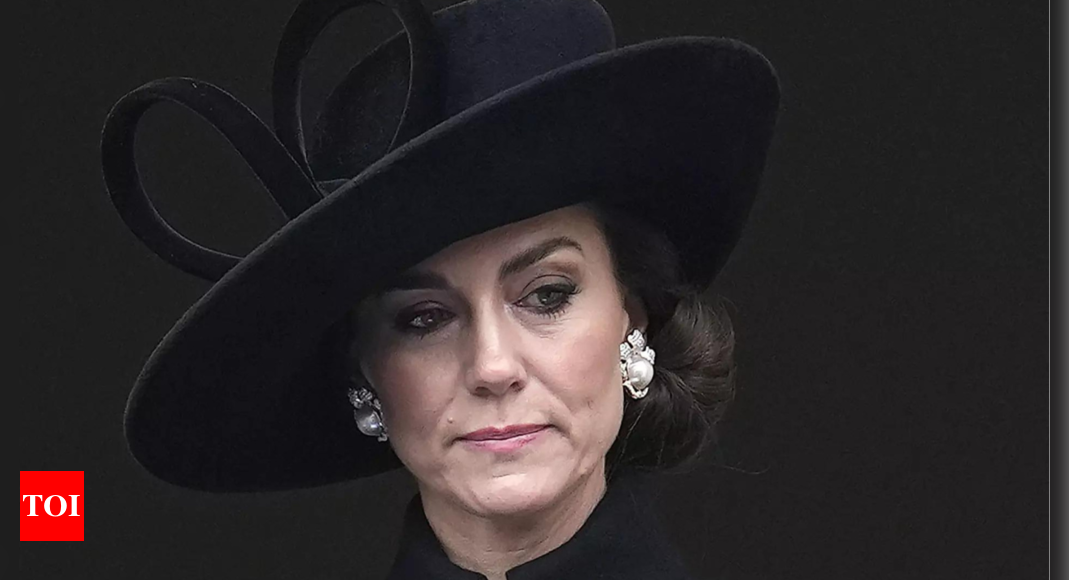LifeStyle
Kate Middleton diagnosed with cancer after ‘major abdominal surgery’: Here’s all about it helobaba.com

After undergoing a major abdominal surgery in January this year, Kate Middleton has been diagnosed with cancer. The Princess of Wales has updated about her health condition via a video message which has been released through the official Instagram account. In the video, Kate says she underwent abdominal surgery which was successful and was a non-cancerous condition.However, subsequent tests revealed of cancerous growth in her body.
The nature of cancer has not been revealed.
She said that currently she is in the early stages of treatment. “My medical team therefore advised that I should undergo a course of preventative chemotherapy and I am now in the early stages of that treatment,” said Kate dressed in jeans and a jumper. She looked pale and tired in the video.
Due to her health condition and post-surgery Kate was absent from public life which stirred intense speculation.
Abdominal surgery plays a crucial role in the diagnosis, treatment, and management of various types of cancer affecting organs within the abdominal cavity. Surgeons may perform procedures such as tumor resection, lymph node dissection, or organ removal to remove cancerous tissues and prevent the spread of cancer cells to other parts of the body. Advancements in surgical techniques, such as minimally invasive procedures and robotic-assisted surgery, have improved outcomes and reduced recovery times for many cancer patients undergoing abdominal surgery. These approaches often result in smaller incisions, less pain, and faster recovery compared to traditional open surgery.
However, abdominal surgery itself can pose risks, including bleeding, infection, and damage to surrounding organs or tissues. Additionally, surgery may impact digestive function, necessitating dietary modifications or long-term medical management.
In cases where cancer has metastasized to abdominal organs, surgery may be part of a multidisciplinary approach alongside chemotherapy, radiation therapy, or targeted therapy. For example, ovarian cancer often requires abdominal surgery to remove tumors and affected tissues, followed by chemotherapy to target any remaining cancer cells.
Overall, abdominal surgery remains an integral component of cancer treatment, offering the potential for disease removal or control while requiring careful consideration of risks and benefits for each patient.
News of Kate’s health condition is another blow to the British Royal Family as King Charles III is also undergoing cancer treatment. The King was seeking treatment for enlarged prostate and later it was revealed that he has cancer for which he was receiving treatment for prostate; but it is not prostate cancer an official spokesperson has confirmed. Duchess of York, Sarah Fergusson is another royal family member who is battling melanoma.
The nature of cancer has not been revealed.
She said that currently she is in the early stages of treatment. “My medical team therefore advised that I should undergo a course of preventative chemotherapy and I am now in the early stages of that treatment,” said Kate dressed in jeans and a jumper. She looked pale and tired in the video.
Due to her health condition and post-surgery Kate was absent from public life which stirred intense speculation.
Abdominal surgery plays a crucial role in the diagnosis, treatment, and management of various types of cancer affecting organs within the abdominal cavity. Surgeons may perform procedures such as tumor resection, lymph node dissection, or organ removal to remove cancerous tissues and prevent the spread of cancer cells to other parts of the body. Advancements in surgical techniques, such as minimally invasive procedures and robotic-assisted surgery, have improved outcomes and reduced recovery times for many cancer patients undergoing abdominal surgery. These approaches often result in smaller incisions, less pain, and faster recovery compared to traditional open surgery.
However, abdominal surgery itself can pose risks, including bleeding, infection, and damage to surrounding organs or tissues. Additionally, surgery may impact digestive function, necessitating dietary modifications or long-term medical management.
In cases where cancer has metastasized to abdominal organs, surgery may be part of a multidisciplinary approach alongside chemotherapy, radiation therapy, or targeted therapy. For example, ovarian cancer often requires abdominal surgery to remove tumors and affected tissues, followed by chemotherapy to target any remaining cancer cells.
Overall, abdominal surgery remains an integral component of cancer treatment, offering the potential for disease removal or control while requiring careful consideration of risks and benefits for each patient.
News of Kate’s health condition is another blow to the British Royal Family as King Charles III is also undergoing cancer treatment. The King was seeking treatment for enlarged prostate and later it was revealed that he has cancer for which he was receiving treatment for prostate; but it is not prostate cancer an official spokesperson has confirmed. Duchess of York, Sarah Fergusson is another royal family member who is battling melanoma.
How early screening is important in cancer detection and treatment








